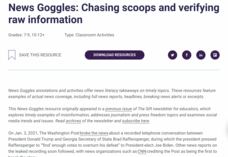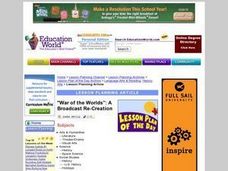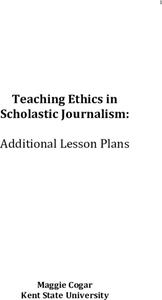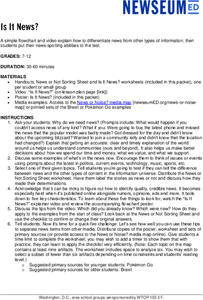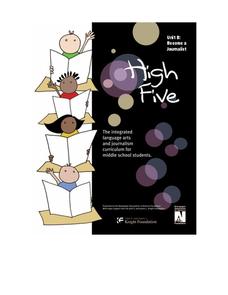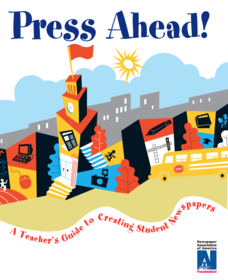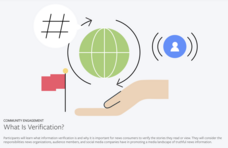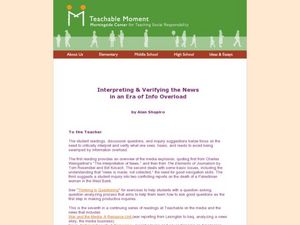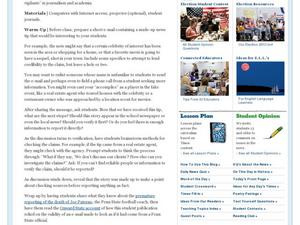Reporters Without Borders
2017 World Press Freedom Index
Freedom of the press was seen as a right so important that the Founding Fathers listed it as part of the first amendment to the United States Constitution. Americans pride themselves on this freedom, but just how free are American...
Newseum
'The Press and the Civil Rights Movement' Video Lesson
Scholars watch a video featuring journalists who covered the civil rights movement, then respond to questions on a viewing guide. The video features interviews with participants and original news footage from the 1950s and 1960s. In...
Media Smarts
The Newspaper Front Page
Hot off the presses! A perfect instructional activity idea for a journalism class or even a language arts class looking to incorporate some informational texts. Young writers analyze the front pages of various newspapers to determine the...
News Literacy Project
News Goggles: Chasing Scoops and Verifying Raw Information
A 23-slide presentation teaches young media analysts how to identify a scoop or exclusive first report of a breaking story, how these reports become verified, and how subsequent reports in other news sources add information or refocus...
Newseum
Free Press Challenges Through History: Analyzing Historical Sources
The debate over the integrity of stories in media is not new. Young journalists analyze historical sources that reveal freedom of the press controversies and draw parallels to challenges freedom of the press faces today.
Curated OER
War and the Media Press Freedom vs. Military Censorship
Learners analyze the relationship between war and media. In this media awareness instructional activity, students listen to their instructor present a lecture on freedom of the press and military censorship. Learners participate in an...
PBS
Journalism in War Time: What Does the Public Need to Know?
A viewing of the documentary War Feels Like War, launches an exploration of the importance of accurate and comprehensive war reporting. Groups investigate various news agencies and assess the factors that influence their stories. A...
Curated OER
"War of the Worlds": A Broadcast Re-Creation
Why did Orson Welles' 1938 Broadcast of a adaptation of H.G. Wells' The War of the Worlds cause such a panic? To answer this question, class members listen to the original broadcast and research the panic that resulted. They then engage...
Curated OER
Is the media aiding Global Peace when reporting on religion?
Students play 'telephone' to simulate communication difficulties. In this media analysis instructional activity, students read and analyze newspaper articles related to religious tensions between the Pope and Muslims. Students evaluate...
Kent State University
Teaching Ethics in Scholastic Journalism
Events in recent years have underscored the importance of a free and independent press in a democracy. Young journalists engage in lessons about the function of journalism in a democratic society, practice the steps of Bok's Ethical...
News Literacy Project
News Goggles: Tracking Developing Stories
A 28-slide presentation introduces viewers to the process reports go through to track and verify developing news stories. Using the reports of the attacks at Atlanta, Georgia, massage parlors as an example, viewers are taught what to...
Royal Conservatory of Music
The Anti-bullying Magazine
Get the word out about friendship, support, and a safe school community with a media literacy lesson about bullying. Young journalists investigate instances of bullying and take descriptive pictures as they compile a magazine to fight...
News Literacy Project
News Goggles: Identifying the News Source
A 25-slide presentation teaches viewers how to identify the source of stories in newspapers and online news sites. The slides show how to locate the byline where either the reporter's name or the wire service that provided the story can...
Newseum
Is It News?
Is it news or not? That is the question young journalists must consider in a lesson about newsworthiness. Class members watch a short video that details five key characteristics of quality, credible news. Individuals then use these tips...
Curated OER
Kids' Newsbreaks
Group learners together to identify a question relating to an issue and create a 60-second kids news break highlighting information that begins to answer the question. They research and answer issue questions in a news story format.
Online Publications
Become a Journalist
Explore the newspaper as a unique entity with a detailed and extended unit. The unit requires learners to consider the newspaper's role in democracy, think about ethics, practice writing and interviewing, and examine advertising and news...
West Virginia Department of Education
Intelligence of Authentic Character - News Coverage and John Brown's Raid
The resource, a standalone, shows how news coverage of John Brown's Raid began when the event happened and how that reporting shaped perception in West Virginia history. The resource includes interesting anticipatory discussion...
PBS
Journalism Ethics
As a journalist, would you publish everything you heard or saw? Discuss the ethics of journalism with a lesson from PBS. Young reporters imagine themselves to be the editor of their school's newspaper, and as they read five scenarios,...
Newseum
Bias Through History: Analyzing Historical Sources
Young journalists use the E.S.C.A.P.E. (evidence, source, context, audience, purpose, and execution) strategy to evaluate historical and contemporary examples of bias in the news. The class then uses the provided discussion questions to...
Newspaper Association of America
Press Ahead!
Give class members some great news! A media unit teaches individuals about ethics, parts of a newspaper, business writing, photojournalism, and more topics that have to do with the press. Full of material for a variety of learners,...
Facebook
What Is Verification?
One of the most important skills news consumers and social media users must develop is the ability to determine the veracity of stories they read or view. Here's an interactive lesson plan that teaches high schoolers how to verify news...
American Press Institute
Newspapers in Your Life: What’s News Where?
Big news isn't necessarily newsworthy everywhere! How do journalists decide what to cover with so much happening around them? A instructional activity on media literacy examines the factors that affect the media's choice of stories to...
Curated OER
Interpreting & Verifying the News in an Era of Info Overload
Students practice their critical thinking skills. In this media awareness lesson, students read articles about media overload and interpretation of media. Students respond to discussion questions and discuss how they verify news....
Curated OER
Check It Out: Verifying Information and Sources in News Coverage
If it’s in the news it must be true, right? Prompted by a New York Times article, class members consider the importance of accuracy in reporting and validating sources. The detailed plan includes warm-up exercises, discussion questions,...





